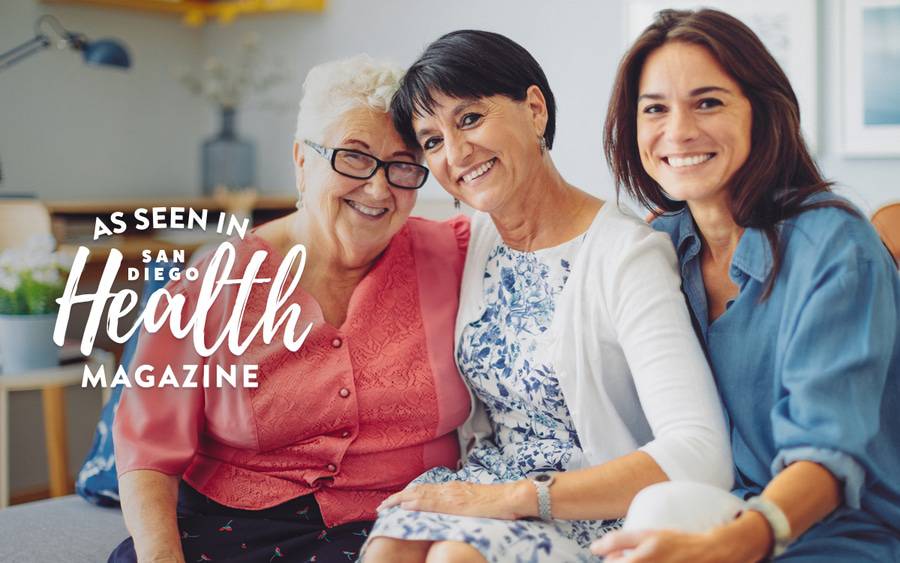5 Ways to Avoid Caregiver Burnout
For “sandwich generation” caregivers, self-care is equally important

For “sandwich generation” caregivers, self-care is equally important
One in every eight Americans between the ages of 40 and 60 cares for an aging parent. The task is compounded when those adults must simultaneously care for their children. That’s the taxing reality for the so-called “sandwich generation,” which feels pressure from two directions at once, often on top of full-time work, leaving little time for self-care.
“It’s a cumbersome journey no matter how well-equipped all sides think they are,” says Mohammed Shaker, MD, an internal medicine physician at Scripps Clinic Rancho Bernardo. “It can be physically, emotionally and financially draining on all, even for families who are financially secure.”
Common burdens of caring for aging parents
Sandwich generation caregivers not only have myriad responsibilities, but their efforts require a variety of sacrifices. Research shows:
- Caregivers spend between 16 and 26 hours caring for older family members each week
- One in five caregivers provide financial help to an aging loved one, and many more lend emotional support
- Data from the RAND Corporation suggests all the work performed by America’s unpaid family caregivers would cost around $642 billion annually if it were completed by skilled nursing professionals
- According to a 2016 AARP report, caregivers’ out-of-pocket costs average nearly 20% of their incomes
Understanding caregiver burnout
Caring so much for others can leave the caregivers themselves stressed and burned out. As much as 40% of people in the sandwich generation experience feelings of being overwhelmed or stressed, which can lead to high blood pressure, heart disease, diabetes, anxiety, depression and poor sleep.
“I’ve witnessed the caregiver spiral into a catatonic state on many occasions, Dr. Shaker says. “They can’t find joy in life. They feel overextended, powerless and sometimes even useless.”
The predicament can last decades — and is especially difficult when the aging parent has dementia.
“Patients with dementia cannot express their symptoms, which makes it very hard for their adult children to understand or gauge how to help,” says Dr. Shaker. “This can translate into feelings of guilt or frustration.”
Self-care tips for caregivers
“While you are deeply entangled in caring for others, please make self-care a priority whenever possible,” urges Dr. Shaker. The following tips can help you take care of yourself — mind, body and spirt — while you’re caring for others:
1. Stay active
Even a few minutes of daily exercise has untold benefits beyond weight management and cardiovascular health. Finding an activity that you enjoy can help you feel less stressed, improve your mood and increase your energy level.
2. Eat regular, nourishing meals
Skipping meals can decrease energy and increase feelings of irritability. In addition to maintaining a normal meal schedule, avoid processed foods and limit alcohol — both cause inflammation in the body, and alcohol can also interfere with sleep.
3. Make sleep a priority
Figure out how much sleep you need nightly to feel rested and refreshed, and aim for that amount. Lack of sleep affects your mood and memory, and can even lead to anxiety, depression or other health problems.
4. Find a few minutes to relax
You don’t have to practice yoga or meditation to achiever inner calm. Try reading, gardening, knitting or any other peaceful activity that lets you slow down and take your mind off your to-do list.
5. Stay social
No matter how busy you are, it’s important to maintain connections with people. Schedule a standing, monthly coffee date with a friend. Find a relative who’s willing to come over and keep you company while pitching in with household chores. Or get advice and encouragement from others in your situation by attending a local caregiver support group.
Dr. Shaker says that when you feel overwhelmed, be courageous and ask for help.
“And keep things in perspective,” he adds. “Find comfort in knowing what you are doing for your parents is nothing short of heroic.”

This content appeared in San Diego Health, a publication in partnership between Scripps and San Diego Magazine that celebrates the healthy spirit of San Diego.